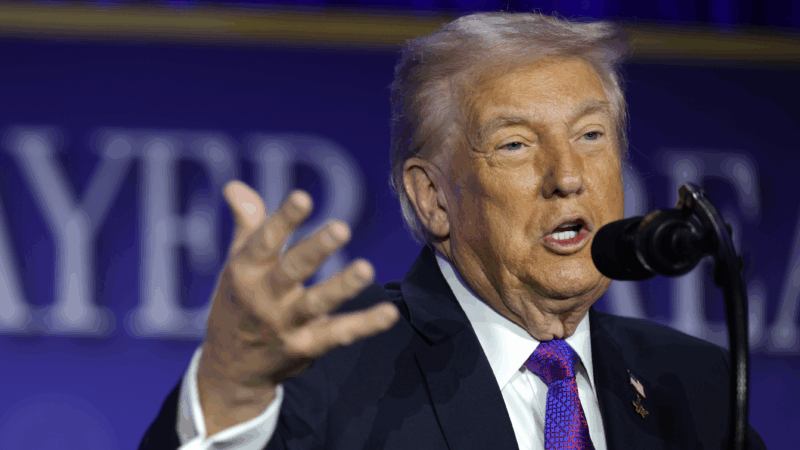RFK Jr. is shrinking the agency that works on mental illness and addiction
The country’s main mental health agency, the Substance Abuse and Mental Health Administration, commonly known as SAMHSA, is in the process of being dissolved. It has lost more than a third of its staff of about 900 this year as part of recent reductions in the federal workforce. President Trump’s budget bill cuts $1 billion from the agency’s operating budget, and its mission is being folded into a new entity shaped by Health Secretary Robert F. Kennedy Jr.
Lawmakers, researchers and health care providers are concerned. At a hearing held by the House Appropriations Committee last month, some Democratic lawmakers grilled the health secretary about this. Rep. Madeleine Dean, representing suburban Philadelphia, asked Kennedy about these changes in light of the recent progress in overdose deaths.
“A 27% reduction in overdose deaths in this country,” said Dean, who has personal experience with opioid addiction through one of her sons who’s in recovery. “Overdose is still stealing a generation in this country. So why in God’s name are we shuttering SAMHSA?”
“We are not shuttering SAMHSA,” Kennedy responded, mentioning his own history of addiction and the loved ones he’s lost to overdose. “What we want to do is we want to shift that function into a place where we’ll be able to administer it more efficiently.”
In March, Kennedy and the Department of Health and Human Services announced that SAMHSA, and other divisions, would be combined into a new entity called the Administration for a Healthy America, or AHA.
SAMHSA was created in 1992 through bipartisan legislation signed by President George H.W. Bush. The agency was tasked with supporting community-based mental health services and addiction treatment and prevention. It mostly accomplished this through grants to states, communities and private groups for mental health and addiction related services.
In recent years, the agency’s budget has grown to address the increasing demand for mental health and addiction care. In 2024, SAMHSA’s budget was about $7.5 billion, the bulk of which flowed to states for specialized programs to address mental health issues and addiction.
For example, the agency gave over $519 million for 988, the Suicide and Crisis Lifeline, and behavioral crisis response services, and a little over $1 billion for mental health service block grants.
‘Backbone of behavioral health’
“The SAMHSA grants are absolutely necessary,” says psychologist Rachel Winograd at the University of Missouri-Saint Louis. She directs the university’s addiction science team, which receives SAMHSA funding. They’ve used the money to buy and distribute medications for substance use disorders, overdose prevention, and for a range of services to people with addiction, says Winograd, “whether it’s drop-in centers, recovery, housing, treatment, delivery, you name it.”
Those funds “are the backbone of behavioral health in this country,” she says. “If those grants were to go away, we’d be screwed.”
Improved access to Naloxone, a medication to reverse opioid overdose, made possible through SAMHSA grants to states, has contributed to the reduction in overdose deaths, says Miriam Delphin-Rittmon, the former assistant secretary of the agency. Based on data collected by SAMHSA, she says, “The number of [overdose] reversals has continued to go up.”
Funds from the agency have become a lifeline for rural communities, says Adriatik Likcani, a marriage and family therapist and professor at the University of Central Missouri, in Warrensburg, Mo.
“Rural communities don’t have a lot of funding locally to fund treatment or recovery, so SAMHSA grants brought life into those communities,” says Likcani, who also runs Recovery Lighthouse, a small non-profit offering recovery services for addiction. “It funded initiatives that they were never able to fund and helped start these recovery centers that helped us meet the need.”
Before that, he says, people with addiction had to travel an hour or more for treatment.
They would “go to a rehab for 21 days or 30 days and then come back home and no service is present to be able to continue working on their recovery or go to prison because of drug related crimes,” he says.
One example of an initiative introduced and funded by SAMHSA, he says, was the idea of using peer specialists – people themselves in recovery who are trained to help others with addiction.
“In Missouri, we did not have peer support and it was through SAMHSA grants in early 2000 where they funded these systems to hire peers to join the workforce,” says Likcani.
It helped meet a workforce shortage, he adds, and helped develop a more effective system for recovery from substance use disorders. And it was so successful, he says, that the state is funding peer support programs across Missouri. “It started from zero to over 60 organizations now being contracted within state systems to provide peer support.”
Loss of technical expertise
The immediate impact of the recent changes at SAMHSA on Likcani and his colleagues in rural Missouri, has been the loss of technical support from the agency’s regional office in Kansas City, which was shut down on April 1 along with all the agency’s regional offices across the country,
“They came on the ground teaching us best practices,” says Likcani. “They worked hands-on with organizations, from developing strategic plans [to helping] you understand how federal funding works.”
And while he hasn’t lost funding yet, he is anxious that he and other communities like his might lose funding to keep their recovery centers open.
Elsewhere in the country, too, state agencies and providers that rely on SAMHSA funding and technical support are feeling isolated, lost and reluctant to reach out to the federal staff left at the agency, says Dr. Eric Rafla-Yuan, a psychiatrist in San Diego, Calif.
“Often their contacts have been fired, the contacts go unanswered. You sort of have the sense across a lot of the health agencies that you’re just on your own,” says Rafla-Yuan, who also works with the California Office of Emergency services, co-chairing a group to ensure equitable access to 988.
The agency not only provided the funds to its grantees, says Rafla-Yuan, they also provided expertise and guidance to effectively use those funds. For example, for states and communities who received SAMHSA grants to set up a crisis response system through 988, the agency provided guidelines for what a “crisis system should look like,” he says. “What staffing ratios should be, what kind of qualifications should folks have.”
But now with so many of the federal staff gone, grantees don’t have anyone to help them troubleshoot problems with their crisis response systems. “All of that is really uncertain,” he says. “There are no answers at all.”
These issues were among the topics discussed at a forum organized by Sen. Tammy Baldwin, D-Wis., and Peter Welch, D-Vt., to understand the potential impacts of changes to the US Health and Human services, including the dismantling of SAMHSA.
“This dramatic loss of institutional knowledge and subject matter expertise will be felt by states and communities who rely on SAMHSA’s policy and programmatic guidance to promote mental health, prevent substance misuse, and provide treatments and supports that foster recovery,” said Trina Dutta, the former chief of staff at the agency under the Biden administration.
Recent investments in the agency – through bipartisan legislation – had achieved remarkable successes in lowering both opioid overdose and, in some age groups, suicide deaths in the country, Dutta said.
At the House Appropriations Committee hearing, Kennedy told lawmakers that his moving SAMHSA into his new Administration for a Healthy America (AHA) would allow the agency to better address all chronic diseases including mental illnesses and addiction. But Rep.Dean pressed him to explain his thinking behind this.
“Why would we, when we are finally seeing some success, bury that success, put it in an AHA program?” Dean asked. “We have to now rehire people and figure out what their roles will be within AHA?”
Kennedy didn’t answer her question, but said he would ensure people with addiction have access to overdose prevention and other medications.
Transcript:
AYESHA RASCOE, HOST:
The nation’s main mental health agency is being dissolved, and it’s already lost roughly a third of its staff. The Substance Abuse and Mental Health Administration, or SAMHSA, is being folded into another entity as Secretary Robert F. Kennedy Jr. reshapes federal health agencies. These changes have some lawmakers and health care providers concerned. NPR health correspondent Rhitu Chatterjee is here to tell us more. Hi, Rhitu.
RHITU CHATTERJEE, BYLINE: Hi, Ayesha.
RASCOE: So can you remind us what SAMHSA is and what is the agency’s main job?
CHATTERJEE: Absolutely. So SAMHSA, you know, was created in 1992 because of bipartisan legislation that was signed by President George H. W. Bush. And its main job has been to give funds to states, communities, private groups for mental health and addiction-related services, both on the prevention side and on treatment. And, you know, these funds have gone to services like, say, 988, the Suicide and Crisis Lifeline, which served more than 10 million people in its first year. And also things that serve important and vulnerable populations like mental health services in schools, mental health clinics in communities, and medication for overdose prevention. And these funds have been critical for Americans to access care for behavioral health. I spoke with Adriatik Likcani, who’s a marriage and family therapist at Recovery Lighthouse. That’s an addiction recovery center in Warrensburg, Missouri.
ADRIATIK LIKCANI: Rural communities don’t have a lot of funding locally to fund treatment or recovery. So SAMHSA grants really were a lifeline. It sort of brought life into those communities. It funded initiatives that they were never able to fund. And it created these recovery centers that helped us meet the need.
CHATTERJEE: And, you know, Ayesha, that meant that people in these rural communities didn’t have to travel anymore for treatment, making recovery more likely. And, you know, Likcani gave me an example of an initiative that SAMHSA not just funded but also introduced to Missouri, and that’s using peer support for recovery, and that’s when you have people who are themselves in recovery, getting trained to help others.
RASCOE: So how have the recent staff layoffs at the federal level affected things for him in Missouri? Like, has he lost any of his funding?
CHATTERJEE: Not yet, but, you know, he is nervous because President Trump’s big, beautiful bill cuts $1 billion from SAMHSA’s budget, and he is disappointed and disheartened that the regional SAMHSA office in Kansas City, Missouri, that he and his colleagues relied on so much for guidance and support has been shuttered, along with other regional offices. And I also heard this from health care providers in other states, too. Here’s Dr. Eric Rafla-Yuan, a psychiatrist in San Diego.
ERIC RAFLA-YUAN: States and entities have just been really hesitant to reach out to some of the federal staff. Often, their contacts have been fired, the contacts go unanswered. And so it sort of have the sense across a lot of the health agencies that you’re just on your own.
CHATTERJEE: And so without that guidance and advice on best practices from people in SAMHSA, there’s concern that people won’t really be able to be as effective with their money when it comes to providing care.
RASCOE: Does Congress have any say with these changes? Are lawmakers, you know, making any statements on this?
CHATTERJEE: So Congress has not approved these changes, but during a recent hearing by the House Appropriations Committee, Democrats grilled the health secretary about this. Madeleine Dean represents suburban Philadelphia in Congress, and she’s had personal experience with the opioid epidemic. One of her sons is in recovery from opioid addiction. And she asked Kennedy about these changes in light of the recent progress in overdose deaths.
(SOUNDBITE OF ARCHIVED RECORDING)
MADELEINE DEAN: Twenty-seven percent reduction in overdose deaths in this country. Overdose is stealing a generation in this country, so why in God’s name are we shuttering SAMHSA?
ROBERT F KENNEDY JR: We are not shuttering SAMHSA. And I share your concerns, and I’m anxious to work with you on this problem.
CHATTERJEE: And, you know, Kennedy went on to say that he was bringing SAMHSA into his new Administration for a Healthy America, or AHA, to address chronic diseases, including mental illness and addiction. But Dean pushed him to explain his thinking behind this.
(SOUNDBITE OF ARCHIVED RECORDING)
DEAN: Why would we, when we are finally seeing some success, bury that success, put it in an AHA program? Which, by the way, logically doesn’t make any sense. We have to now rehire people and figure out what their roles will be within AHA.
CHATTERJEE: And she asked him if he’d done any analysis to support his decision, and Kennedy didn’t really answer that, but he did say that he’d make sure that people with addiction had access to overdose prevention and other medications. And we will be keeping an eye on how all this plays out.
RASCOE: That’s NPR’s Rhitu Chatterjee. Thank you so much for breaking this down for us.
CHATTERJEE: My pleasure.
Trump calls SCOTUS tariffs decision ‘deeply disappointing’ and lays out path forward
President Trump claimed the justices opposing his position were acting because of partisanship, though three of those ruling against his tariffs were appointed by Republican presidents.
The U.S. men’s hockey team to face Slovakia for a spot in an Olympic gold medal match
After an overtime nailbiter in the quarterfinals, the Americans return to the ice Friday in Milan to face the upstart Slovakia for a chance to play Canada in Sunday's Olympic gold medal game.
NASA eyes March 6 to launch 4 astronauts to the moon on Artemis II mission
The four astronauts heading to the moon for the lunar fly-by are the first humans to venture there since 1972. The ten-day mission will travel more than 600,000 miles.
Skis? Check. Poles? Check. Knitting needles? Naturally
A number of Olympic athletes have turned to knitting during the heat of the Games, including Ben Ogden, who this week became the most decorated American male Olympic cross-country skier.
Police search former Prince Andrew’s home a day after his arrest over Epstein ties
Andrew Mountbatten-Windsor, the British former prince, is being investigated on suspicion of misconduct in public office related to his friendship with the late convicted sex offender Jeffrey Epstein.
Violinist Pekka Kuusisto is not afraid to ruffle a few feathers
On his new album, the violinist completely rethinks The Lark Ascending by Ralph Vaughan Williams, and leans into old folk songs with the help of Sam Amidon.








